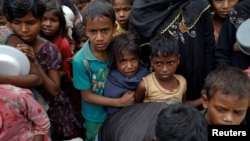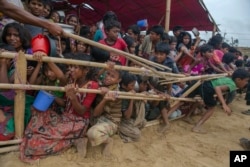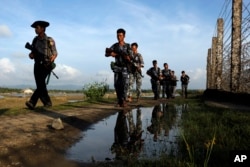Many Rohingya families who have fled to Bangladesh from Myanmar are marrying off their daughters early to ease the financial burden of looking after them. Girls as young as 12 years old from the refugee families are being married off so that their parents have fewer children to feed at home.
Since the military launched the first round of “clearance operations” in Rakhine last year, over 700,000 Rohingya have fled Myanmar. More than 625,000 of them fled to Bangladesh after the latest outbreak of violence in Rakhine in August, which, according to United Nations (UN) Human Rights Chief Zeid Ra'ad Al Hussein, could contain “elements of genocide” against the Rohingya Muslims.
Rohingya refugees who have fled Myanmar since last year are now living in makeshift bamboo-and-plastic shacks in the refugee camps spread across southeastern Bangladesh. Largely dependent on charity hand-outs and rations from refugee agencies, most of these refugees are living hand to mouth.
Food shortage
Many of these families with large number of children complain that the ration they get from the United Nations World Food Program is not enough and they are going through a food shortage.
Noor Ankis, a Rohingya refugee living in Balukhali area of Cox’s Bazar, said hardship has forced her to plan to marry off her underage daughters.
“My husband is partly paralyzed and cannot do any job. With the small amount of food ration which I get I cannot take good care of my family with five children. For Jannatara, 14, and Johora, 12, I am looking for grooms,” Ankis told VOA.
“I know that a girl should be married after she is 18 or 19. But, with my husband not earning, I cannot feed my five children. So, I want to marry off the two daughters now.”
Habibur Rahman, program head of the Bangladeshi international charity BRAC, said the fact that a food crisis is leading to the early marriage of Rohingya girls is a matter of “serious concern” and the government and non-governmental agencies should do more to address the crisis.
“A refugee household with more than eight members gets two ration cards but the household which has seven members is entitled to one card. As a result, there is a risk of a Rohingya girl child getting married early and that would mean more food per ration. By marrying off daughters early, parents aim to transfer their responsibility of feeding daughters to their husbands or in-laws,” Rahman told VOA.
Rahman said in Bangladesh, the Rohingya parents are also marrying off their sons early.
“Rohingya parents are marrying off their sons with young girls as separate individual families to ensure more ration cards for food. Those families can stock extra food and sell it later for cash money in local markets.”
Sexual violence
Aid workers helping the Rohingya refugees in Bangladesh say that along with the food crisis, concerns about sexual violence is also contributing to the rise in number of the child brides. They say many young Rohingya women and children allege they were targets of sexual abuse in Myanmar, a charge strongly denied by the Myanmar government.
“They raped many Rohingya young and old women around us in Rakhine. After my husband was shot dead by the military we somehow managed to flee to Bangladesh safely. Inside a small tarpaulin shack we all are huddling in (in Bangladesh). The food ration which we get is not enough and I cannot feed my children as much as they want,” said Rohingya refugee Samsun Nahar, who along with her nine children fled to Bangladesh in September.
Nahar said that like many other refugees, she worries about her family being forced to return to Myanmar and she desperately wants her 14 and 13-year old daughters to be married off as soon as possible.
“I am fearful of my daughters being targeted in rape and torture in Myanmar in future,” she said. “My neighbors are searching for two good boys for my daughters now.”
Many Rohingya who have crossed over to Bangladesh since last year said the increasing incidences of sexual violence scared them into fleeing Myanmar along with their families largely to protect their young daughters from the threat of rape.
Aid workers say the practice of marrying off daughters earlier than usual started among the Rohingya in Myanmar soon after several Rohingya women were reportedly raped by security forces during a communal riot in Rakhine in 2012.
Sitting in her ramshackle bamboo-and-plastic sheet shack, 14-year old Sitara Begum comforted her baby to sleep. She said her first year in her teens was also her first year of married life.
And, she will give birth to her second baby next year, the Rohingya refugee girl said.
“My father died long ago. My elder sister was mentally disabled and mother was sick. We were very poor. My mother could not manage our family and feed us properly,” said Begum, who fled to Bangladesh along with her husband and 4-month-old baby in September.









